Advertisements
Advertisements
Question
For an experiment in Botany, two different plants, plant A and plant B were grown under similar laboratory conditions. Their heights were measured at the end of each week for 3 weeks. The results are shown by the following graph.
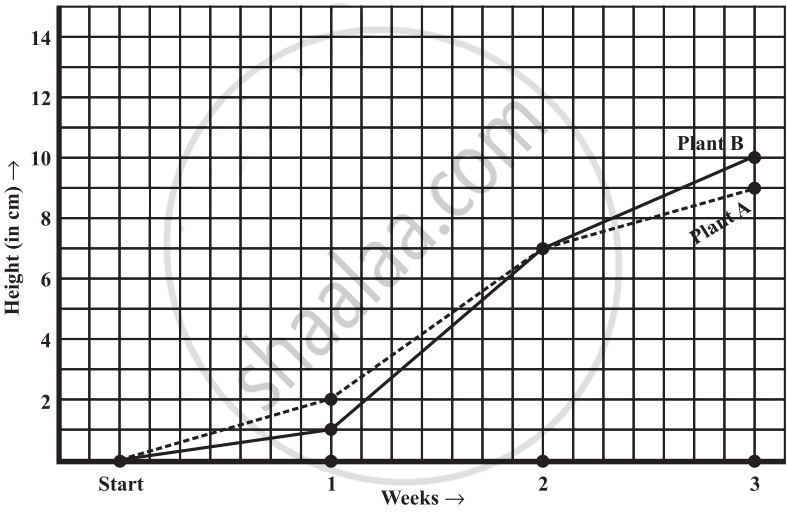
- How high was Plant A after (i) 2 weeks (ii) 3 weeks?
- How high was Plant B after (i) 2 weeks (ii) 3 weeks?
- How much did Plant A grow during the 3rd week?
- How much did Plant B grow from the end of the 2nd week to the end of the 3rd week?
- During which week did Plant A grow most?
- During which week did Plant B grow least?
- Were the two plants of the same height during any week shown here? Specify.
Solution
- After 2 weeks, the height of plant A was 7 cm.
- After 3 weeks, the height of plant A was 9 cm.
- After 2 weeks, the height of plant B was 7 cm.
- After 3 weeks, the height of plant B was 10 cm.
-
- Growth of plant A during 3rd week = 9 cm − 7 cm = 2 cm
- Growth of plant B from the end of the 2nd week to the end of the 3rd week
- = 10 cm − 7 cm = 3 cm
- Growth of plant A during 1st week = 2 cm − 0 cm = 2 cm.
- Growth of plant A during 2nd week = 7 cm − 2 cm = 5 cm.
- Growth of plant A during 3rd week = 9 cm − 7 cm = 2 cm
- Therefore, plant A grew the most, i.e. 5 cm, during the 2nd week.
- Growth of plant B during 1st week = 1 cm − 0 cm = 1 cm.
- Growth of plant B during 2nd week = 7 cm − 1 cm = 6 cm.
- Growth of plant B during 3rd week = 10 cm − 7 cm = 3 cm.
- Therefore, plant B grew the least, i.e. 1 cm, during the 1st week.
- At the end of the 2nd week, the heights of both plants were same.
APPEARS IN
RELATED QUESTIONS
Use the tables below to draw linear graphs.
The number of days a hill side city received snow in different years.
| Year | 2003 | 2004 | 2005 | 2006 |
| Days | 8 | 10 | 5 | 12 |
Can there be a time-temperature graph as follows? Justify your answer.
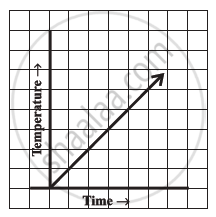
Can there be a time-temperature graph as follows? Justify your answer.
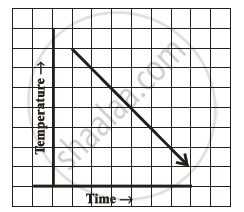
Can there be a time-temperature graph as follows? Justify your answer.
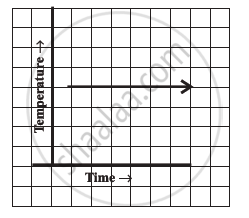
The following table shows the sales of a commodity during the years 2000 to 2006.
| Years: | 2000 | 2001 | 2002 | 2003 | 2004 | 2005 | 2006 |
| Sales (in lakhs of Rs): | 1.5 | 1.8 | 2.4 | 3.2 | 5.4 | 7.8 | 8.6 |
Draw a graph of this information.
Draw the temperature-time graph in each of the following cases:
| Time (in hours): | 8:00 | 10:00 | 12:00 | 14:00 | 16:00 | 18:00 | 20:00 |
| Temperature (°F) in: | 100 | 101 | 104 | 103 | 99 | 98 | 100 |
Find out from the growth chart
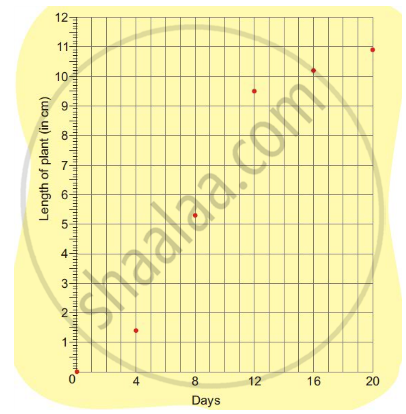
- Between which days did the length of the plant change the most?
Study the given graph and complete the corresponding table below.

The following graph shows the change in temperature of a block of ice when heated. Use the graph to answer the following questions:
- For how many seconds did the ice block have no change in temperature?
- For how long was there a change in temperature?
- After how many seconds of heating did the temperature become constant at 0°C?
- What was the temperature after 25 seconds?
- What will be the temperature after 1.5 minutes? Justify your answer.
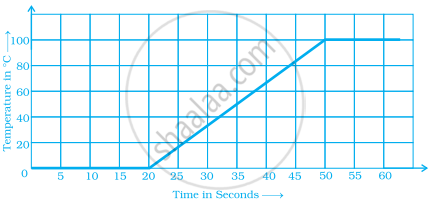
As part of his science project, Prithvi was supposed to record the temperature every hour one Saturday from 6 am to midnight. At noon, he was taking lunch and forgot to record the temperature. At 8:00 pm, his favourite show came on and so forgot again. He recorded the data so collected on a graph sheet as shown below.
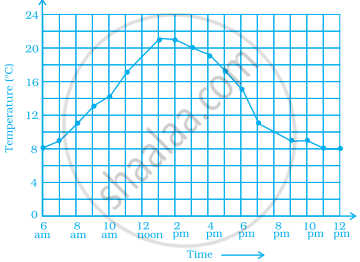
- Why does it make sense to connect the points in this situation?
- Describe the overall trend, or pattern, in the way the temperature changes over the time period shown on the graph.
- Estimate the temperature at noon and 8 pm.
